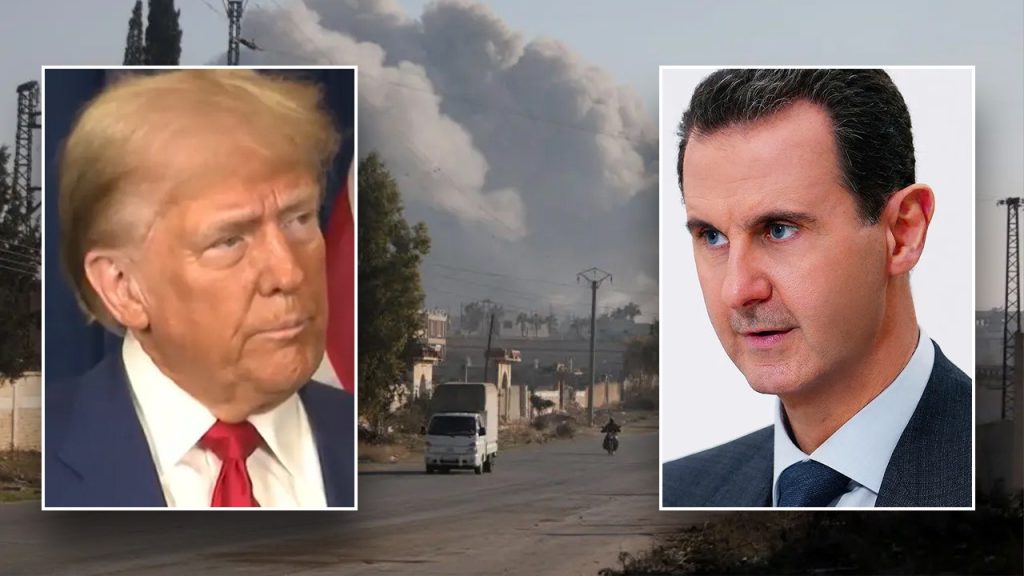The Syrian civil war, a conflict marked by brutal violence and complex geopolitical entanglements, has once again erupted into a critical phase, drawing the attention of former U.S. President Donald Trump. Islamist rebels have launched a surprise offensive, capturing key cities and advancing towards Damascus, challenging the Assad regime’s hold on power. Trump, weighing in on the unfolding crisis via Truth Social, reiterated his longstanding non-interventionist stance on Syria, arguing that the United States should avoid involvement in the conflict. He criticized former President Obama’s handling of the 2013 chemical weapons attack, accusing him of weakness for not enforcing the “red line” he had drawn. This inaction, according to Trump, emboldened Assad and allowed Russia to increase its influence in the region.
Trump’s commentary reflects his “America First” foreign policy doctrine, emphasizing the need to prioritize domestic interests and avoid entanglement in foreign conflicts deemed peripheral to U.S. national security. He views the Syrian conflict as a quagmire with limited strategic value for the United States, advocating for a hands-off approach. His criticism of Obama’s handling of the chemical weapons attack serves to underscore his perceived strength and decisiveness in contrast to what he considers to be Obama’s fecklessness. While acknowledging the humanitarian crisis unfolding in Syria, Trump maintains that direct U.S. military intervention would not be beneficial and could further destabilize the region.
The rapid advance of the Islamist rebels, spearheaded by groups like Hayat Tahrir al-Sham (HTS), has caught the Assad regime, its allies Russia and Iran, and international observers off guard. The speed with which major cities like Aleppo and Hama fell to the rebels suggests a significant shift in the balance of power on the ground, potentially signaling the imminent collapse of Assad’s rule. The Israeli military has heightened its alert level and deployed reinforcements along the Golan Heights border, anticipating potential spillover effects from the escalating violence in Syria. The United Nations has also expressed concern about the escalating conflict and the potential for further humanitarian suffering.
The United States, while officially condemning the violence and calling for a political solution based on the UN Security Council Resolution 2254, appears reluctant to directly intervene in the conflict. Secretary of State Antony Blinken has engaged in diplomatic discussions with Turkish Foreign Minister Hakan Fidan, emphasizing the importance of protecting civilians and achieving a political resolution. Turkey, a key backer of the Islamist rebel coalition, plays a pivotal role in the evolving dynamics of the Syrian conflict. While the U.S. expresses concerns about the involvement of designated terrorist groups like HTS in the rebel coalition, it continues to rely on Turkey as a partner in managing the regional instability.
Expert analysis suggests that the Assad regime’s internal corruption and lackluster mobilization efforts have contributed to its rapid decline. The swift fall of major cities indicates a significant weakening of Assad’s forces and a potential turning point in the protracted civil war. The possibility of Assad resorting to chemical weapons again as a last resort cannot be ruled out, adding another layer of complexity and concern to the already volatile situation. The unfolding events in Syria pose significant challenges for regional stability and international security, with potential implications for the wider Middle East and beyond.
The future of Syria remains uncertain as the Islamist rebels push towards Damascus. The Assad regime, weakened and facing an unprecedented challenge, may resort to increasingly desperate measures to maintain its grip on power. The potential for further humanitarian suffering is high, with civilians caught in the crossfire of the escalating violence. The international community, grappling with the complex dynamics of the conflict, faces difficult choices in responding to the unfolding crisis. While calls for a political solution continue, the rapidly shifting realities on the ground may necessitate a reassessment of existing strategies and a renewed effort to find a sustainable path toward peace and stability in Syria.

